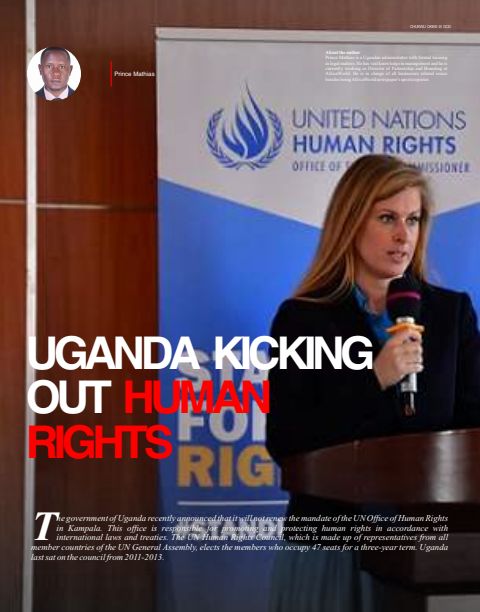
By: Prince Mathias
The government of Uganda recently announced that it will not renew the mandate of the UN Office of Human Rights in Kampala. This office is responsible for promoting and protecting human rights in accordance with international laws and treaties. The UN Human Rights Council, which is made up of representatives from all member countries of the UN General Assembly, elects the members who occupy 47 seats for a three-year term. Uganda last sat on the council from 2011-2013.
The Human Rights Council holds regular sessions to address human rights violations and emergencies in specific countries. Each of the 193 UN member states must undergo a Universal Periodic Review (UPR) based on reports from different sources, including non-governmental organizations (NGOs).
Last year, the UN Committee against Torture (CAT) concluded its consideration of the Second Periodic Report for Uganda in Geneva, Switzerland. During Uganda’s CAT review, reports of the existence and use of unauthorized places of detention in Uganda, and the Internal Security Organisation (ISO) arbitrarily detaining more than 400 people, including persons accused of spying, collusion and dissent against President Yoweri Museveni, and the alleged torture of an opposition member of Parliament were noted.

A few months later, on Feb. 08, the government announced it was not renewing the mandate of the UN Office of Human Rights. The current term of the OHCHR ends in August.
The decision to kick out the UN Office of Human Rights could have serious consequences for Uganda. The country is dependent on international goodwill for its socio-economic development. The Uganda Human Rights Commission (UHRC) is preparing for its upcoming Review in 2023 by the Sub-Committee on Accreditation of the Global Alliance of National Human Rights Institutions (GANHRI). Currently, the UHRC has an “A” Status as National Human Rights Institution. But the UN Human Rights Council which Uganda has now booted is the secretariat of the GANHRI.
The recent government booting of first DGF and now OHCHR sends a chilling cloud over the activities of many UN and donor programmes in Uganda. Other UN organizations that have similar agreements with the government as the booted OHCHR include the United Nations Development Programme (UNDP), the United Nations Children’s Emergency Fund (UNICEF), the United Nations High Commissioner for Refugees, the World Food Programme (WFP), the United Nations Population Fund (UNFPA), the United Nations Industrial Development Organisations (UNIDO), International Organization for Migration (IOM), the Food and Agriculture Organization (FAO), the United Nations Office of Drugs and Crime (UNODC), the United Nations Capital Development Fund (UNCDF), the World Health Organization (WHO), the United Nations Office for Project Service (UNOPS) and UN Women.
The decision to kick out the UN Office of Human Rights could have serious consequences for Uganda. The country is dependent on international goodwill for its socio-economic development.

